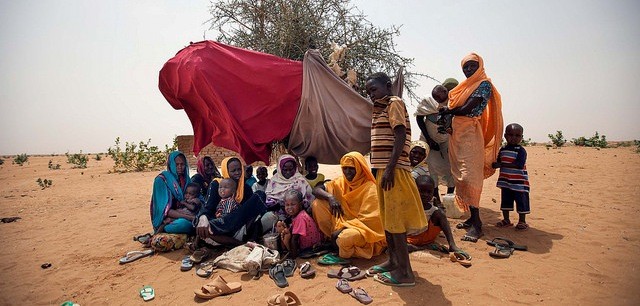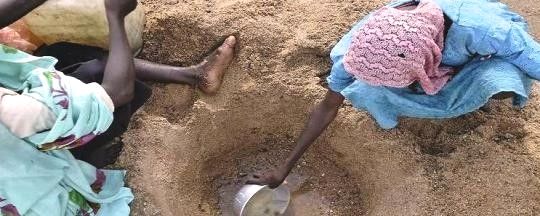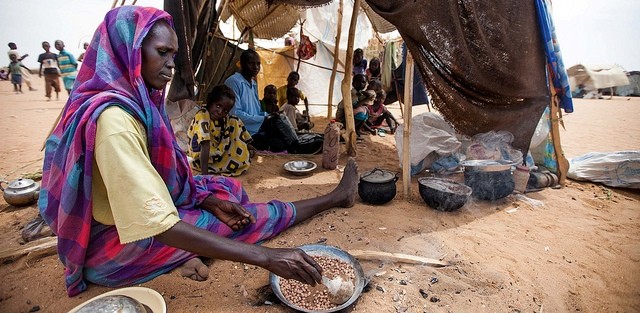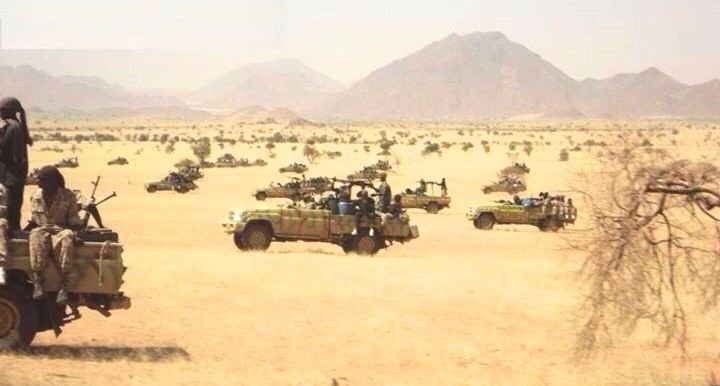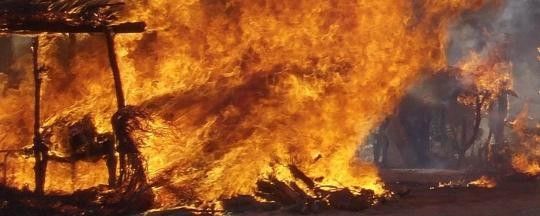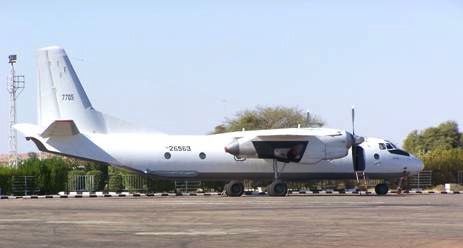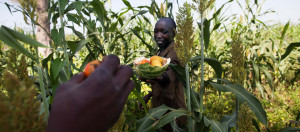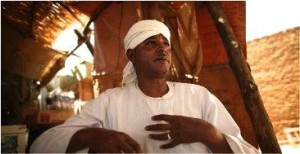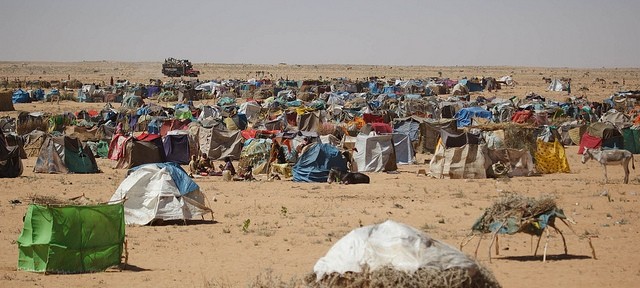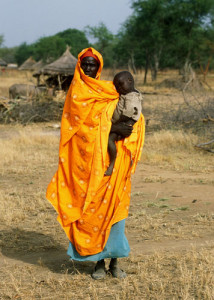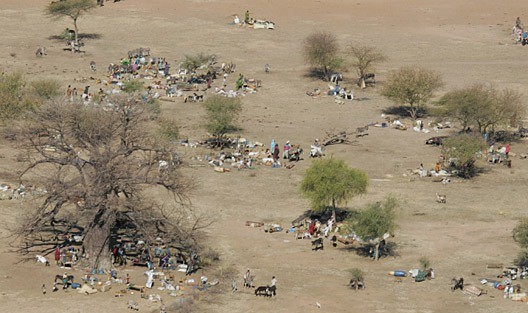This is the fifth installment of a digest containing what I believe to be the most important stories reported by Radio Dabanga in the previous week. Radio Dabanga has been by far our most important and reliable source of information about what is occurring in Darfur, and provides a great deal more than the UN/African Union Mission in Darfur (UNAMID), the UN Office for the Coordination of Humanitarian Affairs (OCHA), and the largely worthless quarterly reports of the UN Secretary-General. The emphasis in this week’s digest, comprising ten dispatches, is on deteriorating humanitarian conditions and the signs that—as the rainy season and traditional “hunger gap” begin—conditions will deteriorate even further, with greatly heightened malnutrition, morbidity, and mortality.
This digest, per usual, looks back only a week, to March 22, 2015, and is still perforce highly selective. Most dispatches have been edited to some degree for length; any editorial comments on my part appear italicized in [brackets]; all emphases within the cited texts have been added.
Eric Reeves, 29 March 2015
Darfur: Radio Dabanga Digest, Number 1 | http://wp.me/p45rOG-1CD
Darfur: Radio Dabanga Digest, Number 2 | http://wp.me/p45rOG-1De
Darfur: Radio Dabanga Digest, Number 3 | http://wp.me/p45rOG-1Dt
Darfur: Radio Dabanga Digest, Number 4 | http://wp.me/p45rOG-1Ei
Darfur: Radio Dabanga Digest, Number 5 | http://wp.me/p45rOG-1EL—and below
************************************
People frequently flee with only the barest of possessions—they are highly disproportionately women and children
• Darfur’s Jebel Marra residents suffer from fever, thirst
March 27, 2015 | Mashrou Abu Zeid
Fevers and other diseases as a result of malnutrition have spread among internally displaced people living near Mashrou Abu Zeid in East Jebel Marra. In addition to that, drinking water is scarce in the area in Darfur. Villagers of Wadi Barkroi reported to Radio Dabanga that malnutrition is common among the approximately 3,000 displaced people, and that fevers spread quickly. The 201 displaced families in Wadi Ashara, northeast of Mashrou Abu Zeid, witness the same spread of diseases. They further reported that residents of Numira, Dali, Massalit, Dolma, Sharafa and Humeida villages suffer from a scarcity of drinking water.
Mashrou Abu Zeid is near Fanga, a former rebel stronghold. Government forces and pro-government militia members clashed in the beginning of this year with armed rebels in the area. Many have sought refuge in Wadi Ashara when the paramilitary Rapid Support Forces, backed by the Sudanese Air Force, attacked their villages in the mountainous East Jebel Marra in January. Aid organisations are still unable to access people in parts of East Jebel Marra, in particular in the area of Golo and Rokoro locality in Central Darfur.
[This pattern continues to be repeated over and over again in North Darfur, but the other Darfur states as well. Villages are attacked because of their proximity to rebel strongholds; the Rapid Response Forces (the “new Janjaweed”), with the support of the Sudan Armed Forces (SAF) aircraft, displace civilians into areas that have inadequate water and food. The regime completes the job by denying humanitarian access (now five years for Jebel Marra). The denial of humanitarian access to rebel-controlled areas of South Kordofan and Blue Nile continues as policy, with no significant response or plan by the international community to end these sieges of death.]
Water supplies and water tables in many locations are dangerously low.
• People dying of fever, diarrhoea in Darfur’s Jebel Marra
March 25, 2015 | Golo
A number of people in western Jebel Marra, Central Darfur, died of fever and diarrhoea during the past week. “In particular the newly displaced are suffering from a bad health,” a listener told Radio Dabanga from the area of Golo. “Many have died already from contagious fevers and diarrhoea. The most recent case was Maryam Adam Musa, who passed away in Bouri village on Monday. Others are in critical condition.” He urged the authorities and health organisations to provide health care and medicines to the people in the area “as soon as possible.”
[As Darfur approaches the rainy season, which typically coincides with the “hunger gap”—the period between the end of previous year’s food supplies and fall harvest—it is important to keep in mind the close relationship between malnutrition, morbidity, and mortality. Especially for children under five, acute malnutrition can easily lead to disease and death. An internal UNICEF document from last year (leaked but still not publicly released) reported that Global Acute Malnutrition for children under five in North Darfur was 28 percent—almost three times the emergency threshold for this population in a war zone. Ban Ki-moon has nothing useful to say about these realities in his quarterly reports on Darfur and UNAMID.]
• Darfur displaced reject “food ration cards inventory”
March 2, 2015 | Kalma Camp
The Coordination Office of the Darfur Displaced and Refugees Association has strongly rejected plans by the Sudanese Humanitarian Aid Commission (HAC) to conduct an inventory of food ration cards in the camps for the displaced. The Coordination Office considers the step as a prelude to stop humanitarian aid to the displaced, Yagoub Ismail, Displaced and Refugees Coordinator told Radio Dabanga from Kalma camp in South Darfur on Wednesday. “We unanimously reject the HAC plans on the basis that any notice about food distribution is supposed to come from the joint Humanitarian Coordination Secretariat in Sudan,” he stated, pointing out that HAC officials “in the past have dropped tens of thousands of food ration cards under the pretext of re-registration of the displaced.”
[Camp Coordinator Yagoub Ismail is right to be fearful that an “inventory taking” by Khartoum’s nefarious Humanitarian Aid Commission (HAC) is likely to be a prelude to reducing or halting humanitarian assistance. We have seen the UN World Food Program cooperating in this effort, both be deliberately denying former beneficiaries food, and by virtue of WFP’s inability to reach various camp locations. Some have been without food delivery for months. As has long been fully clear, Khartoum’s goal is to compel “returns” of the displaced persons in the camps and then to shut the camps, denying the international humanitarian community a rationale for continued presence in Darfur. HAC is the face of the regime in this effort.
Many Darfuris are doing with painfully little in the way of food assistance; the meal here is likely to be for this woman’s entire family and perhaps others. Many such people have no comprehension of “ration cards” or the various demands of camp life; others understand the system all too well. Until people can grow and raise their own food, malnourishment will be a fact of life in Darfur.
• Newly displaced without aid in North Darfur’s Shaddad camp
March 2, 2015 | Shaddad Camp
87 families, who fled from villages in East Jebel Marra to the Shaddad camp for the displaced, near Shangil Tobaya in Tawila locality, are still living in the open, without assistance. “They arrived from the villages of Dubo, Falouja, and Sawani, which were attacked by government forces two months ago,” a Shaddad camp resident explained to Radio Dabanga. “The families are living in the open, without food or cover, until now,” he said.
The engine of human displacement in Darfur: Khartoum’s reconstituted Janjaweed, the “Rapid Support Forces” (RSF).
[Such dispatches, focusing on particular groups of displaced and the specific nature of what they have suffered, are continuously reported by Radio Dabanga. The often spend long periods of time before the receive help or entry into a camp—if they ever do. Many die from exposure, dehydration, disease, and starvation. It is important to remember in this context just how much humanitarian capacity has been reduced, with a great many withdrawals by organizations as well as further expulsions by Khartoum.
[In March 2009, the regime expelled 13 of the most important INGOs working in Darfur and shut down three important Sudanese national humanitarian organizations. This represented roughly half the total humanitarian capacity at the time, and despite promises by (then) Senator John Kerry that the situation would be remedied in a matter of weeks, with full restoration of capacity, that capacity in 2015 is far below what it was even after the ruthless and completely unjustified expulsions of 2009.]
• Fire guts 25 shelters in West Darfur’s Kendebe camp
March 24, 2015 | Kendebe Camp
A fire that broke out at Kendebe camp for the displaced in Sirba locality on Sunday, destroyed 25 shelters. “The full contents of the 25 homes, food and the proceeds of the last agricultural season, burned to ashes,” the coordinator of the Sirba camps told Radio Dabanga. He claimed that the fire was caused by arson, and accused “government bodies” of being behind all the fires, which broke out in the camp during the past months.
[Arson can be a notoriously difficult crime for which to assign blame; but the number of fires in camps for the displaced cannot be explained simply by noting the proximity of dwellings and the nature of construction materials. Many of these fires are clearly deliberately set to further Khartoum’s efforts to make camp life intolerable for the displaced persons within them.]
The dwellings in displaced persons camps are extremely vulnerable to arson attacks
• Air raid ignites large fires in Darfur’s East Jebel Marra
March 23, 2015 | East Jebel Marra
The Sudanese Air Force bombed the area of Debbat Naira in East Jebel Marra on Sunday. Speaking to Radio Dabanga, sources from the area reported that the four bombs dropped by an Antonov killed four donkeys, and ignited large fires. They noted that the aerial attack caused panic among the residents of Debbat Naira, and renewed their appeal to the government to stop the air raids on civilian targets.
[It is also important to remember that a great many fires are set by the deliberate attack on civilian villages by Antonov “bombers” of the SAF. Retrofitted Russian-built cargo planes, they have no militarily useful accuracy, but are immensely effective as weapons of civilian terror and destruction, including by means of fires started by the bombings.]
The Antonov-26 is now the most commonly used “bomber” in Khartoum aerial military arsenal
• East Darfur hospital closed as staff strike continues
March 23, 2015 | Adila
The strike of hospital workers in Adila, East Darfur, entered its 11th day on Sunday. The personnel of the only hospital in Adila decided on the strike in protest against the non-payment of salaries. The strike has led to the closure of the hospital, leaving the patients no place to turn to. Their relatives appealed through Radio Dabanga to the federal and East Darfur governments to solve the problem of the delayed salaries “as quickly as possible.”
[This refusal by the Khartoum regime to fund even the most critical parts of the health system in Darfur is entirely typical. As the economy continues to implode, as we hear more reports of bread and flower shortages—for lack of foreign exchange currency with which to import these staples—the regime responds with increasingly desperate “savings” measures. Refusing to pay the staff of a key hospital is finally not surprising.]
• “Sudanese alms spent on investment projects”
March 29, 2015 | Khartoum
A government research centre has accused the Sudanese Zakat Chamber of embezzlement and misusing its funds. The Islamic alms institution has spent its funds, obtained by Zakat taxes and donations, on investment projects that benefit the state and its institutions, instead of the poor and needy, Sudanese newspapers reported on Friday.
“…[funds for] investment projects that benefit the state and its institutions, instead of the poor and needy…”
[This and the previous dispatch are a distillation of regime spending priorities, and the kind of criminal diversion of supposedly charitable revenues, that have made Khartoum’s Sudan the fourth most corrupt country in the world, according to the Corruptions Perception Index (only North Korea, Somalia, and Afghanistan fared worse in the rankings). The implosion of the economy does not mean that corruption and misappropriation of large sums of money has diminished. It has led to more creative—and morally revealing—efforts by many of the regime’s cronies, who are receiving less and less as the economy spirals downward.
[The economic implosion is having other consequences. We may be sure, for example, that Khartoum’s decision to join Saudi Arabia in its assault on the Shiite—and Iran-backed—Houthis of Yemen was one of financial necessity as much as putative “Arab Solidarity.” Saudi Arabia will pay all the poor Arab countries that assist it in the war effort, and Sudan certainly falls into that category. Geographically, Sudan is ideally suited for air missions and even moving a limited amount of ground force to the combat theater.
[This reflects a notable about-face for the regime, which has previously supported the Houthis, to the dismay of the Saudis. But this was in the days, not so long ago, when Khartoum felt that its “strategic ally” in the region was Iran—and that Saudi Arabia and the Gulf States were to be accommodated only insofar as they might provide financial and investment assistance. See the leaked minutes of an August 31, 2015 meeting of the most senior military and security officials in the regime. See also a synopsis of Khartoum’s shifting attitude toward Saudi Arabia and the Houthis | http://wp.me/p45rOG-1EC]
• “Vote for Al Bashir, or starve”: Commissioner to West Darfur displaced
March 23, 2015 | Sirba Locality, West Darfur
The Commissioner of Sirba locality in West Darfur, has allegedly threatened the displaced with starvation, if they do not vote for Al Bashir in the forthcoming election.
[This is perfectly in character with the regime as it desperately seeks a victory in the mid-April elections that will have at least the sheen of legitimacy, even as the August 31 minutes make clear the extensive plans to buy the elections, as well as the various political and electoral machinations that have long been at the ready.]
The displaced living in Abu Suruj camp in Sirba locality, West Darfur, rejected the launch of the electoral campaign by members of the ruling National Congress Party (NCP) on Saturday. Camp residents threw stones at the officials, forcing them to leave.
In response, the Commissioner of Sirba locality threatened the camp residents with thirst and starvation. He said that the water would be cut off, and that they would be denied access to their farmlands. The camp would be dismantled and the displaced would be expelled from the area if they do not vote for the incumbent President. The coordinator of the Sirba camps described the threats to Radio Dabanga as “unacceptable, and a violation of the Sudanese Interim Constitution, and human rights in Darfur.”
[A prime example of Khartoum’s view of the “political process” and what will be part of any “National Dialogue” conducted by the regime; see also two related stories below]
Despite the suggestion to the contrary by the Sirba Locality Commissioner, few Darfuris are able to farm their land, and those that do live if terror when away from village or camp.
Al Bashir urges people of Darfur “to expel the devil”
March 23, 2015 | Khartoum Addressing a rally in Nyala, South Darfur, on Thursday, the incumbent president said that the 2011 Doha Document for Peace in Darfur has met all the demands of the Darfuris. “There is no longer any need for carrying arms, except for those who want to undermine peace. “It was the devil that entered Darfur, dismantled the social fabric, and divided the people until they disagreed, and began fighting with each other,” he said in his electoral campaign speech, urging the Darfuris to curse the devil, and “expel him by deeds, not by words.” Sheikh Musa Hilal, former Janjaweed leader and head of the Mahameed tribe in Darfur, announced that his Revolutionary Awakening Council has decided to support the candidacy of the incumbent Sudanese president. Hilal had previously threatened to disrupt the election.
Al-Bashir doing his own, all too persuasive imitation of the devil. Indicted on multiple counts of genocide and massive crimes against humanity in Darfur, his campaign surrogate in West Darfur has provided the president with his campaign slogan:
“Vote for me or I will starve you and your families!”
[Give the common translation of “Janjaweed”—“devils on horseback”—there is a perverse irony in al-Bashir enjoining the people of Darfur to “expel the devil,” more than adequately embodied by al-Bashir himself and Musa Hilal, now campaigning for al-Bashir. We may be sure that Musa Hilal, the most notorious of the Janjaweed leaders, was paid handsomely to sign on in support of the regime’s “re-election” efforts.
Musa Hilal, the most notorious of the Janjaweed leaders in the early years of the genocide
[Predictably, in Darfur, al-Bashir continues to flog the dead horse that is the Doha Document for Peace in Darfur (DDPD)—a fraud and a snare that has yielded nothing for the people of Darfur since it was signed almost four years ago. Unfortunately, al-Bashir has plenty of company in flogging this “agreement” as a viable diplomatic option: the UN, including the Secretary General and the Security Council; the African Union; and most of the countries of Europe. This in effect gives al-Bashir’s regime credit for a peace “agreement” overwhelmingly rejected by Darfuri civil society and the consequential armed Darfuri rebel movements. It also leaves no diplomatic room for a credible and inclusive Darfur peace process to begin.]
“International agents behind Arab, African extremism”: NCP
March 23, 2015 | Khartoum Officials of the ruling National Congress Party (NCP) have accused “international agencies” of being behind the extremism spreading in Arab and African countries. The families of the group of Sudanese medical students who recently travelled to Syria and are believed to be working in hospitals of the Islamic State, have rushed to Turkey in an attempt to retrieve their children.
Mustafa Osman Ismail, head of NCP’s Political Bureau, accused “internal and external actors, and international intelligence agencies of being the driving force behind the extremism in Arab and African societies, by funding it with weapons and facilitating communication.” “Extremism cannot be addressed through violence,” he stressed. “Extremists in Sudan have been treated through dialogue, after which they rejoined the society.”
[This is half-hearted propaganda on the part of longtime National Islamic Front/National Congress Party stalwart (and previous foreign minister), Mustafa Osman Ismail; he is of course fully aware of how preposterous his explanation of current violence in the Middle East will appear to the outside world. The perverse mendacity is for internal consumption.]
“We all have to be attentive to plans aiming to distract youths from building their homeland and squander the resources of the continent on useless wars and conflicts,” [said Ismail].
[Of course this is precisely what Khartoum is not doing: the younger generations in Sudan—people in their twenties and thirties—suffer disproportionately from unemployment and underemployment. A system of cronyism leaves career paths open primarily to members of the ruling party. Under-employment, and employment not reflecting the level of education attainment, is also a massive problem in Sudan.
[This is certainly not the first time that Sudanese have left Sudan to engage in terrorist or Jihadist activities; there are numerous accounts in the annual State Department reports on State Sponsors of Terrorism that have implicated Sudanese nationals in terrorist activities, including the attack on the Westgate Mall in Nairobi.]
• “No UNAMID exit before peace in Darfur”: displaced
March 22, 2015 | ZamZam IDP camp
Leaders of the Zamzam camp for the displaced, south of North Darfur’s capital El Fasher, have requested the technical committee working on the exit strategy of UNAMID to consider the rampant insecurity in Darfur. They stressed to a delegation of 42 representatives of the UN, AU, and the Sudanese government who visited the camp on Friday, that the UN-AU peacekeeping mission cannot leave before a just and comprehensive peace has been realised. The camp elders told them that they will hold the UN and the Security Council responsible for “any new attack or act of genocide in Darfur, after UNAMID has left.” A Zamzam camp sheikh told Radio Dabanga that the delegation asked the leaders, sheikhs, omdas, and members of the Zamzam Women and Youth Association to present their vision on the current situation in the camp, the exit of UNAMID, and the voluntary return of displaced people to their places of origin.
“We replied that the situation in the camp is extremely bad. There is no security at all, while the displaced suffer from a severe shortage of drinking water, food, health care, and educational facilities, in particular the newcomers.” The sheikh continued by saying that they told the delegation that “a red line will be crossed when the peacekeepers would leave before a just peace is reached.” “It is the responsibility of the UN to protect the displaced in case UNAMID leaves, especially as security in the region lies now in the hands of militias, who are assaulting, raping and murdering Darfuris as they like. They pillage and torch villages, implementing the policy of ethnic cleansing with total impunity.”
Life for those newly arrived at Zamzam camp near El Fasher in North Darfur
[It is difficult to quarrel with any feature of this assessment. Darfuris in the camps and rural areas are well aware of how poorly UNAMID is functioning, that it has failed in fulfilling its basic mandate of civilian protection. But they also know that withdrawing UNAMID will be to remove the last vestiges of an international reporting presence, however weak, incompetent, and disingenuous it might be. For certainly if UNAMID withdraws, so will the remaining international nongovernmental humanitarian organizations (INGOs). 97 percent of the workers for these organizations are Sudanese nationals; they are likely to be targets for reprisals by the regime, and will be in no position to convey humanitarian information on a systematic or ongoing basis. The last international eyes on the ground will have disappeared.]
The Governor of North Darfur, Osman Kibir, told the delegation that the UNAMID personnel have not been able to protect themselves.
[Though largely true, regime-appointed Governor Kibir neglects to mention that the most deadly attacks on UNAMID have all been established as having been carried out by regime militia proxies (see http://wp.me/p45rOG-11S/.]
“They had to be protected by the Sudanese police.” Kibir accused UNAMID of instead of contributing to the spread of crimes in the region, of “robberies and hijacks, corrupting administrations and counterfeiting money.” He emphasised the Sudanese government’s desire of the peacekeepers’ departure, confirming the nation’s ability to protect its citizens. “Sudan does not need help from UNAMID to maintain security.”
[This last sentence is accurate only with significant modification: “Sudan does not want help from UNAMID to maintain security”—and indeed wants “security” in Darfur to be on its own barbaric terms.
[What Khartoum’s growing drumbeat for UNAMID withdrawal means, what the insistence on an “exit strategy” means, is that the current UN Security Council authorization for UNAMID will not be renewed when it expires (June 30, 2015). If there is any re-authorization not vetoed by Russia, and possibly China, it will be for a force of Khartoum’s design, very substantially reduced in manpower, lethal equipment, communications and transport capacity, and abiding by Khartoum’s version of a “Status of Forces Agreement” (not the current SOFA, which Khartoum has contemptuously ignored, without consequence, since it was signed in February 2008).
[The UN Department of Peacekeeping Operations knows full well that such a force would be a complete waste of peacekeeping funds; but the head of UN DPKO, Hervé Ladsous, has proved disastrously incompetent in foreseeing developments in Darfur, and the risks to civilian protection efforts that have followed from allowing UNAMID to become the conspicuous failure that it is.]
APPENDIX: Representations in Secretary Ban Ki-moon’s recent “Special Report”
A full analysis of the most recent reports on Darfur and UNAMID by UN Secretary-General Ban Ki-moon will be forthcoming, but it seems important to highlight now a few facts from the most recent “Special Report” (6 March 2015), which is wholly inadequate in representing the security crisis throughout Darfur.
The Special report of the Secretary-General on the African Union-United Nations Hybrid Operation in Darfur (15 March 2015) is indeed yet another disgraceful exercise in obfuscation, disingenuousness, and omission. Examples:
• There is only one reference to sexual violence in the entire report: a brief allusion to the mass rape of girls and women in Tabit, North Darfur: “in October 2014, following allegations of mass rape in Thabit, North Darfur, restrictions on access to the area increased considerably.” Despite initially strong words, UN demands for access to Tabit to conduct an investigation have proved—like virtually all UN demands made of Khartoum—worthless.
Despite Ban Ki-moon’s downplaying of the issue of sexual violence in Darfur, epidemic of rape as a weapon of war continues throughout the region. In previous regular quarterly reports, Ban Ki-moon has sometimes omitted any reference to sexual violence. This is unconscionable, given the enormous security risk to the lives and livelihoods of Darfuri women, especially those in the camps.
Darfuri women are terribly exposed to the risk of rape— and it makes no difference whether or not they are mothers, or are carrying infants (a male child might in fact be killed)
• In the Secretary-General’s “Special Report,” the Rapid Response Forces (RSF) appear in only three paragraphs (the document is 18 pages and 9,000 words long); one of these is partially given over to a discussion of RSF presence in South Kordofan and Blue Nile (the “Two Areas”). As a consequence, the report cannot begin to do justice to the level of violence experienced by the people of Darfur at the hands of the RSF. Ban Ki-moon spends most his time in the section on “Security” outlining what are supposedly seven success stories in UNAMID’s provision of security. In each case, the success is limited and completely overshadowed by the many hundreds of similar incidents and threats that UNAMID did not confront or consider.
The supremely feckless Ban Ki-moon, a spineless, arrogant, and hopelessly expedient diplomat—precisely what many at the UN Security Council table wish for. Here he has a warm response to Khartoum’s former ambassador to the United Nations Abdelmahmoud Abdelhalim Mohamed at Khartoum airport, September 2007. Abdelmahmoud Abdelhalim was one of the greatest and nastiest buffoons in UN history. Ban came to office promising to make Darfur a “signature issues”; and his handwriting is indeed all over the massive human destruction and displacement of the past eight years.
• It is not until page 12 that we learn that the “police component [of UNAMID] reduced its strength by 723 individual police officers, four formed police units, and four Professional posts. The repatriation of four formed police units was completely in July 2014.” This reduces the number of formed police units to 13 with responsibility for “covering 49 camps for internally displaced persons.” Moreover, Ban Ki-moon’s report significantly understates the number of camps and large collections of displaced persons in Darfur. Notably, the UN refuses to provide an accurate census of camps, precise locations, populations, and degree of humanitarian access—all of fundamental importance in understanding the challenges to security in Darfur.
Does the bare camp census offered by Ban Ki-moon (49 camps) include locations such as the one in this photograph from North Darfur? Of course it doesn’t, and there needs to be a serious, independent assessment of camp locations and circumstances, and location of large numbers of unregistered but displaced persons. The UN dares not push for such.
Altogether, more than 6,000 personnel have been withdrawn from UNAMID in Darfur, along with undisclosed amount of matériel, including transport vehicles; but the drawdown of formed police units is almost certainly the most consequential from the standpoint of camp security. Given their nature, formed police units from the beginning of UNAMID’s deployment were going to be key; and yet they were very late in deploying, and because they are armed—and sanctioned to use lethal force in certain circumstances—Khartoum made the deployment as difficult as possible. Originally UNAMID was to have deployed 19 such formed police units; last year’s drawdown reduces the number to 13, a clear capitulation to Khartoum on a critical security issue. With this drawdown, UNAMID is even less able to respond to the increasing violence in camps throughout Darfur.
*******************************
“The victims [of the Holocaust] perished not only because of the killers, but also because of the apathy of the bystanders. What astonished us after the torment, after the tempest, was not that so many killers killed so many victims, but that so few cared about us at all.”
[Elie Wiesel, “Why were there so few?”]
